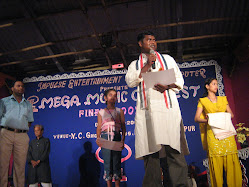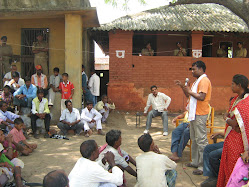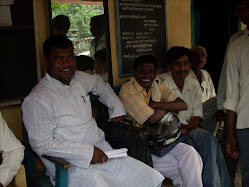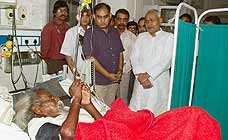Date:04/12/2008
URL: http://www.thehindu.com/thehindu/holnus/004200812040921.htm
Patna (IANS): The Musahar community in Bihar is up in arms against a government proposal to promote rat farming for their uplift, saying the move would keep them where they had always been - at the bottom of India's socio-economic heap.
They have urged the state government to abandon the project. "We want to use the computer mouse rather than adopt rat farming. Times have changed; we are eager to change our lives through information technology," Rashtriya Musahar-Bhuyian Vikash Parishad convener Umesh Manjhi told IANS.
"At a time when people were talking about India's moon mission Chandrayaan-1, it's unfortunate that the Bihar government is planning to start rat farming for Dalits. We will oppose it," he said.
Manjhi said the government's move to start rat farming would end up keeping them backward.
The community derives its name from the practice of eating rats and usually hunt for them in paddy fields.
An estimated 2.3 million Musahars live across Bihar in extremely poor condition. Less than five percent of them are literate and most of them make a living as labourers. They are still considered social untouchables despite a law against it.
The government had announced its intention to popularise rat farming in the state by involving Dalits to help improve their economic status.
But the Musahar community is unhappy. "The poor among the Dalits need education, vocational courses, and not rat farming," said Parishad general secretary Rajender Manjhi.
The state government has announced a pilot project to popularise rat meat in Bihar.
Commercialising rat meat is part of the state government's efforts to uplift Dalit communities that constitute nearly 15 percent of this eastern India state's population of 83 million.
© Copyright 2000 - 2008 The Hindu
Dalit's Watch
Administrative Office: QTR.NO - 480/A, Neora Colony, Khagaul, Patna, Bihar (India) - 801105. Mob - +919031072463, Email - umesh.kumar.manjhi@gmail.com, dalits.wathch@gmail.com
State to set up Maha Dalit panel
17 Aug 2007, 0327 hrs IST , TNN
PATNA: The Bihar government has decided to constitute a Maha Dalit Commission for the welfare of certain Dalit castes who are socially and educationally backward and treated as untouchables even by Dalits. CM Nitish Kumar announced the constitution of the commission during his Independence Day speech at Gandhi Maidan here on Wednesday. The suggestion for such a commission had been made by the Akhil Bhartiya Musahar-Bhuiyan Sangh at a conference here a few months back. Nitish had agreed, in principle, to constitute such a commission. He said, still there were many sub-castes among Dalits like Musahar, Mehtar, Dom, Rajwar and others who do not benefit from the reservation system and other schemes. He said among Dalits, there was no such classification as a backward class, adding that the commission will study the status of the neglected castes and suggest ways for their uplift. It has been noticed that some of Dalit castes could not get any benefit from reservation due to lack of education. In educational institutions, too, the children of these castes are discriminated against and majority of them drop out. As a result, the literacy level among those castes is abysmally low. In the bonded labour system, the men and women mostly belonging to these castes are found to be trapped. The CM said the government would implement the recommendations of the panel for a better social order which would also arouse social and educational consciousness among them.
PATNA: The Bihar government has decided to constitute a Maha Dalit Commission for the welfare of certain Dalit castes who are socially and educationally backward and treated as untouchables even by Dalits. CM Nitish Kumar announced the constitution of the commission during his Independence Day speech at Gandhi Maidan here on Wednesday. The suggestion for such a commission had been made by the Akhil Bhartiya Musahar-Bhuiyan Sangh at a conference here a few months back. Nitish had agreed, in principle, to constitute such a commission. He said, still there were many sub-castes among Dalits like Musahar, Mehtar, Dom, Rajwar and others who do not benefit from the reservation system and other schemes. He said among Dalits, there was no such classification as a backward class, adding that the commission will study the status of the neglected castes and suggest ways for their uplift. It has been noticed that some of Dalit castes could not get any benefit from reservation due to lack of education. In educational institutions, too, the children of these castes are discriminated against and majority of them drop out. As a result, the literacy level among those castes is abysmally low. In the bonded labour system, the men and women mostly belonging to these castes are found to be trapped. The CM said the government would implement the recommendations of the panel for a better social order which would also arouse social and educational consciousness among them.
Woman demands education, health, water and jobs for Musahar community
In the twilight world of Musahars, an untouchable community in India, Girija Devi is a shining exception. After leading a spirited drive to root out alcoholism and get the government to work for her community in the troubled state of Bihar, she has become the first woman from her community of rat-eaters to address a United Nations convention. Musahars are so poor that their staple diet often comprises mice. On 27 February, the unlettered Girija Devi will lead five women from India at the international meeting to talk about the status of women. She will speak in her local Bhojpuri dialect. “I will speak for the equal rights of women and try to draw the attention of the world to women in my state,” she says. There’s no end to the problems of women - and men - in the Musahar community. There are about 1.3 million Musahars in Bihar. Less than 1% of them are literate - the lowest in India, and some 98% of them are landless. The Musahars mostly work on the farms owned by landlords and go without work for up to eight months a year. No wonder alcoholism is rampant among Musahar men, who end up spending more than half of what they earn on cheap locally brewed liquor. This hurts the women and children most. But in her dirt-poor village of Bhirkia-Chhapaulia in East Champaran district, Girija Devi decided to pick up the gauntlet and launch a war against alcoholism a few years ago. Leading a group of women, she demolished local liquor vends and toddy pots hung on the trees by their men. When the sorority found the men drinking, they shaved their heads, garlanded them with shoes and paraded them around the village to shame them into kicking the bottle. Girija Devi has always led by example - her husband Singheshwar Majhi was the first alcoholic to face her wrath. Her untiring efforts have led to 125 Musahar villages in East Champaran to become “alcohol free”. “Earlier our men would come home drunk and beat us up. Now things have completely changed, and our husbands treat us with respect. All thanks to Girija Devi,” says Dhanmati Devi, a local villager. Girija Devi did not stop with combating alcoholism alone - the mother of four children has pushed for roads, schools, teachers and doctors in her villages. She blocked roads, locked up government offices and squatted on railroad tracks to demand for development of her village. Now, thanks to her efforts, Bhirkia-Chhapaulia has a primary school, a brick road and drinking water supply. Seventy per cent of the villagers have got basic government-built homes. The indefatigable woman is still not satisfied with what she has achieved. “I want a high school, a primary health centre, better drinking water, jobs for our men. I will not stop till I get all this from the government,” she says.
Dalit woman fails to address UN
Patna, February 28Girija Devi, at last, failed to address the 50th convention of United Nations on women’s empowerment in New York on February 24. Girija Devi, an illiterate woman from a remote village of Motihari in Bihar, was the first Musahar (the most backward of backward) woman of India to be invited by the United Nations to address its session.But even though the voice of protest of Girija Devi, who heralded a revolution of sorts through her anti-liquor campaign to change the fate of Musahar in and around Motihari, was heard by the United Nations, it seemed to fall on deaf ears of the state administration and passport officials in India.This was despite the “do it now” slogan of Chief Minister Nitish Kumar to change the lackadaisical work culture of babudom in the state.Musahar Bikas Mancha president Chandrika Maji alleged that Girija Devi was forced to run from pillar to post from Motihari to Patna by passport officials to get her passport. “Even the officials of the state administration were not prompt in helping her out,” he regretted.The passport office, finally, handed her the passport on February 25. But by then, it was too late to catch the flight to New Yorh as the convention began on February 24.The voice of the first Musahar woman, thus, ultimately remained unheard.
18 Musahar families are dying of starvation due to negligence of district administration in Varanasi, Uttar Pradesh
The Musahar community, in Varanasi district, is socially and economically one of the most marginalized communities in India and they are poorest amongst poor. The Musahar community falls under the category of the Scheduled Caste. Although the practice of untouchability is a crime in Indian law the Musahar community is not allowed to enjoy ordinary social life with the mainstream society and to share common amenities in the village.People from the Musahar community are deprived of owning property, means of livelihood, and education. For their survival they work as laborers in the agricultural fields or do some other hard physical labour. The remuneration for such work is given in kind, mostly discarded food or grains. Due to this they do not have any savings that they could use during times of need. This forces them into starvation at times when they have no regular work. In such a situation Musahar community largely depends upon the Public Distribution System (PDS) to get food grains at subsidised rate for their survival. But due to corruption in the bureaucracy and due to an almost defunct judiciary, often weaker sections of society are denied of the food grains in the villages because the PDS licensee can easily escape from their criminal offences and malpractices. For further information please also see HA-003-2007.According to the information received 18 Musahar families were not given ration cards until 2006. After a long, strenuous and continuous, struggle 15 Musahar families were given yellow cards which are issued to those families whose living conditions are identified as bellow the poverty line (BPL). BPL families are those who are identified in the rural area with an annual income of Rs. 12000 [272 USD] or less and urban families living in declared and undeclared slums with an annual income of Rs. 17000 [386 USD] or less. As far as the Musahar families are concerned they are qualified for Antyodaya Anna Yojana cards (red cards) which are issued to the poorest of the poor amongst the BPL families.It has been alleged that 3 Musahar families of Indrajit Musahar, Gulab Musahar and Dinesh Musahar, are still deprived of even BPL (yellow) cards.It is alleged that these families are living in Sarai village for generations. Even then the village head of Sarai village was initially not ready to accept that these Musahar families were the residents of Sarai village and thus he denied the right of livelihood of these Musahar families and forced, them including children, to die of hunger. Mithai Musahar, who is one of the BPL card holders (card no. 497457) is not able to buy the food grains on BPL card and his grandson Sanju, who is also suffering from measles, has reached on the verge of dying from starvation due to malnourishment caused from lack of food.It is also alleged that the upper caste people, who are above the BPL, are enjoying the use of red cards which can be issued only in the favour of the poor amongst poorest. It is also alleged that Mr. Jagdeesh Patel the husband of village head of Sarai village Mrs. Urmila and Mr. Chandrashekhar Singh, who is Village Secretary of Sarai village have given the red cards to those people who belong to upper caste families and who are disqualified for holding red cards. BACKGROUND INFORMATION: The PDS was initiated in India decades ago to help the marginalised and the poor sections of Indian society. It is a system through which the government distributes rationed articles for subsidised price. However, the PDS shop owners/licensees do not distribute the articles for the poor people, but sell the articles in black market to private hotels.Illegal dealing in rationed articles is a crime under the provisions of the Essential Commodities Act, 1955. However, it is for the local police to register a crime and investigate it. But since the police fail to do this duty owing to massive corruption and the rationed articles never reach the needy.The same long standing question is that why does it happen? Why the people, who are already in a convenient position and enjoying the privileges of good social and economic living conditions, could dig into the resources earmarked for the poor amongst the poorest?It is possible only because of the endless division of Indian society on the basis of caste and institutionalised corruption. Centralised, complex and absolutely obscure nature of bureaucracy leaves no place for transparency at any level within the system; even the judiciary is no exception to this. In such a situation, the state police have been reduced to a uniformed, but bottom to top corrupt force paid from the government exchequer. This is probably the reason why in spite of several judgments and directions of Supreme Court of India regarding right to food the judgments failed to have any effect to change the status quo. The plight of 18 Musahar families of Sarai village who are still deprived of the benefit of the social security schemes and right to food is a glaring example. SUGGESTED ACTION:Please write to the Chief Minister of Uttar Pradesh to express your concern for the state government's abject failure to address the ongoing corruption and negligence of district administration at different levels which is causing starvation and malnutrition among Musahar community. Please call for investigations and disciplinary action to be taken against the government officials responsible for failure to ensure the right to livelihood of the poor amongst the poorest.
18 Musahar families are dying of starvation due to negligence of district administration in Varanasi, Uttar Pradesh
The Musahar community, in Varanasi district, is socially and economically one of the most marginalized communities in India and they are poorest amongst poor. The Musahar community falls under the category of the Scheduled Caste. Although the practice of untouchability is a crime in Indian law the Musahar community is not allowed to enjoy ordinary social life with the mainstream society and to share common amenities in the village.People from the Musahar community are deprived of owning property, means of livelihood, and education. For their survival they work as laborers in the agricultural fields or do some other hard physical labour. The remuneration for such work is given in kind, mostly discarded food or grains. Due to this they do not have any savings that they could use during times of need. This forces them into starvation at times when they have no regular work. In such a situation Musahar community largely depends upon the Public Distribution System (PDS) to get food grains at subsidised rate for their survival. But due to corruption in the bureaucracy and due to an almost defunct judiciary, often weaker sections of society are denied of the food grains in the villages because the PDS licensee can easily escape from their criminal offences and malpractices. For further information please also see HA-003-2007.According to the information received 18 Musahar families were not given ration cards until 2006. After a long, strenuous and continuous, struggle 15 Musahar families were given yellow cards which are issued to those families whose living conditions are identified as bellow the poverty line (BPL). BPL families are those who are identified in the rural area with an annual income of Rs. 12000 [272 USD] or less and urban families living in declared and undeclared slums with an annual income of Rs. 17000 [386 USD] or less. As far as the Musahar families are concerned they are qualified for Antyodaya Anna Yojana cards (red cards) which are issued to the poorest of the poor amongst the BPL families.It has been alleged that 3 Musahar families of Indrajit Musahar, Gulab Musahar and Dinesh Musahar, are still deprived of even BPL (yellow) cards.It is alleged that these families are living in Sarai village for generations. Even then the village head of Sarai village was initially not ready to accept that these Musahar families were the residents of Sarai village and thus he denied the right of livelihood of these Musahar families and forced, them including children, to die of hunger. Mithai Musahar, who is one of the BPL card holders (card no. 497457) is not able to buy the food grains on BPL card and his grandson Sanju, who is also suffering from measles, has reached on the verge of dying from starvation due to malnourishment caused from lack of food.It is also alleged that the upper caste people, who are above the BPL, are enjoying the use of red cards which can be issued only in the favour of the poor amongst poorest. It is also alleged that Mr. Jagdeesh Patel the husband of village head of Sarai village Mrs. Urmila and Mr. Chandrashekhar Singh, who is Village Secretary of Sarai village have given the red cards to those people who belong to upper caste families and who are disqualified for holding red cards. BACKGROUND INFORMATION: The PDS was initiated in India decades ago to help the marginalised and the poor sections of Indian society. It is a system through which the government distributes rationed articles for subsidised price. However, the PDS shop owners/licensees do not distribute the articles for the poor people, but sell the articles in black market to private hotels.Illegal dealing in rationed articles is a crime under the provisions of the Essential Commodities Act, 1955. However, it is for the local police to register a crime and investigate it. But since the police fail to do this duty owing to massive corruption and the rationed articles never reach the needy.The same long standing question is that why does it happen? Why the people, who are already in a convenient position and enjoying the privileges of good social and economic living conditions, could dig into the resources earmarked for the poor amongst the poorest?It is possible only because of the endless division of Indian society on the basis of caste and institutionalised corruption. Centralised, complex and absolutely obscure nature of bureaucracy leaves no place for transparency at any level within the system; even the judiciary is no exception to this. In such a situation, the state police have been reduced to a uniformed, but bottom to top corrupt force paid from the government exchequer. This is probably the reason why in spite of several judgments and directions of Supreme Court of India regarding right to food the judgments failed to have any effect to change the status quo. The plight of 18 Musahar families of Sarai village who are still deprived of the benefit of the social security schemes and right to food is a glaring example. SUGGESTED ACTION:Please write to the Chief Minister of Uttar Pradesh to express your concern for the state government's abject failure to address the ongoing corruption and negligence of district administration at different levels which is causing starvation and malnutrition among Musahar community. Please call for investigations and disciplinary action to be taken against the government officials responsible for failure to ensure the right to livelihood of the poor amongst the poorest.
Subscribe to:
Posts (Atom)












